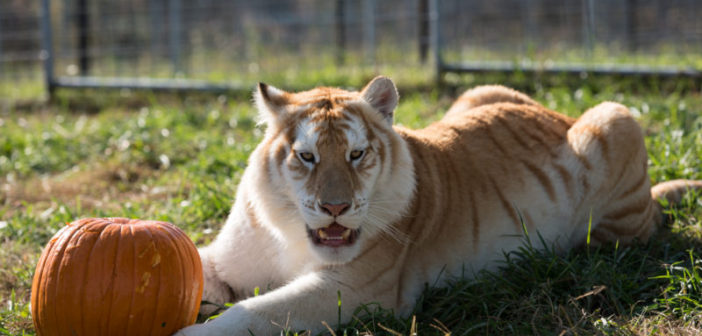Eureka Springs, Arkansas (April 27, 2017) – Turpentine Creek Wildlife Refuge (TCWR) is part of the ongoing battle to protect big cats and other dangerous exotic animals in captivity. In 2005, TCWR worked with Arkansas lawmakers and Governor Mike Huckabee to pass Act 2681, which heavily restricts private ownership of dangerous exotic and native animals in Arkansas. H.R. 1818, a bill commonly known as the Big Cat Public Safety Act, was recently introduced to the House of Representatives. This proposed law would put restrictions on private ownership of dangerous exotic animals nationwide.
Currently, there are no federal laws regulating the private ownership of big cats and other dangerous exotic animals. Only state and local laws prevent your neighbors from keeping these dangerous animals as pets. For years many animal groups and accredited sanctuaries have been working hard to get a federal law passed to regulate private ownership of big cats. On March 30, 2017, House Representative Jeff Denham referred H.R. 1818 to the 115th Congress’s House Committee on Natural Resources[1].
There are an estimated 5,000 – 7,000 tigers living in captivity today[2], of whom only about 400 live in zoos. The total numbers of lions, leopards, jaguars, cheetahs, cougars, big cat hybrids, and other dangerous exotic animals is far larger. These animals could kill or dismember a person with a swipe of their paw or bite with their powerful jaws. Nature made these animals strong enough to kill large prey, and even though they may have been raised around humans, this does not negate their powerful biology and natural instincts to survive. Over the years, hundreds of big cats have escaped and/or seriously injured and killed human beings and pets[3,4]. The worst such incident to date occurred when a man released 51 dangerous exotic animals in Zanesville, Ohio in October of 2011[5].
According to the Humane Society of the United States, there are 5 states in the USA that have zero laws concerning the private ownership of big cats: Alabama, Nevada, North Carolina, South Carolina, and Wisconsin. 11 states do not ban dangerous wild animals as pets but do require permits for some species. 13 states ban some species of dangerous wild animals as pets but allow others. 21 states ban all dangerous wild animals as pets[6].
If passed, the Big Cat Public Safety Act would regulate private ownership of big cats at a federal level. The bill will set forth stricter regulations on facilities that own big cats. It would also regulate the breeding of big cats in captivity by requiring any facilities that breed to be part of an approved conservation population management plan.
A lot of individuals and groups who oppose the Big Cat Public Safety Act argue that it would take away their pets. This is not true. The Big Cat Public Safety Act allows people to keep their current exotic pets as long as they register them with the United States Fish and Wildlife Service within 180 days, and do not breed, acquire, sell, or allow public contact with their exotic animals[1]. The idea is that by stopping people from acquiring new big cats from this point forward, in twenty years’ time exotic pet ownership will no longer be an issue.
Turpentine Creek supports H.R. 1818 – The Big Cat Public Safety Act. We encourage individuals to reach out to their local, state, and federal representatives to let them know that they support H.R. 1818 – The Big Cat Public Safety Act, and believe that their representatives should as well.
Additional Information, Sources & Photos:
http://www.TurpentineCreek.org
https://www.facebook.com/
3 http://www.humanesociety.org/
4 https://bigcatrescue.org/big-
5 http://www.gq.com/story/terry-
6 http://www.humanesociety.org/
Featured image: Khaleesi, a rare “Golden Tabby” tiger who currently lives at Turpentine Creek Wildlife Refuge. Courtesy TCWR, all rights reserved.





